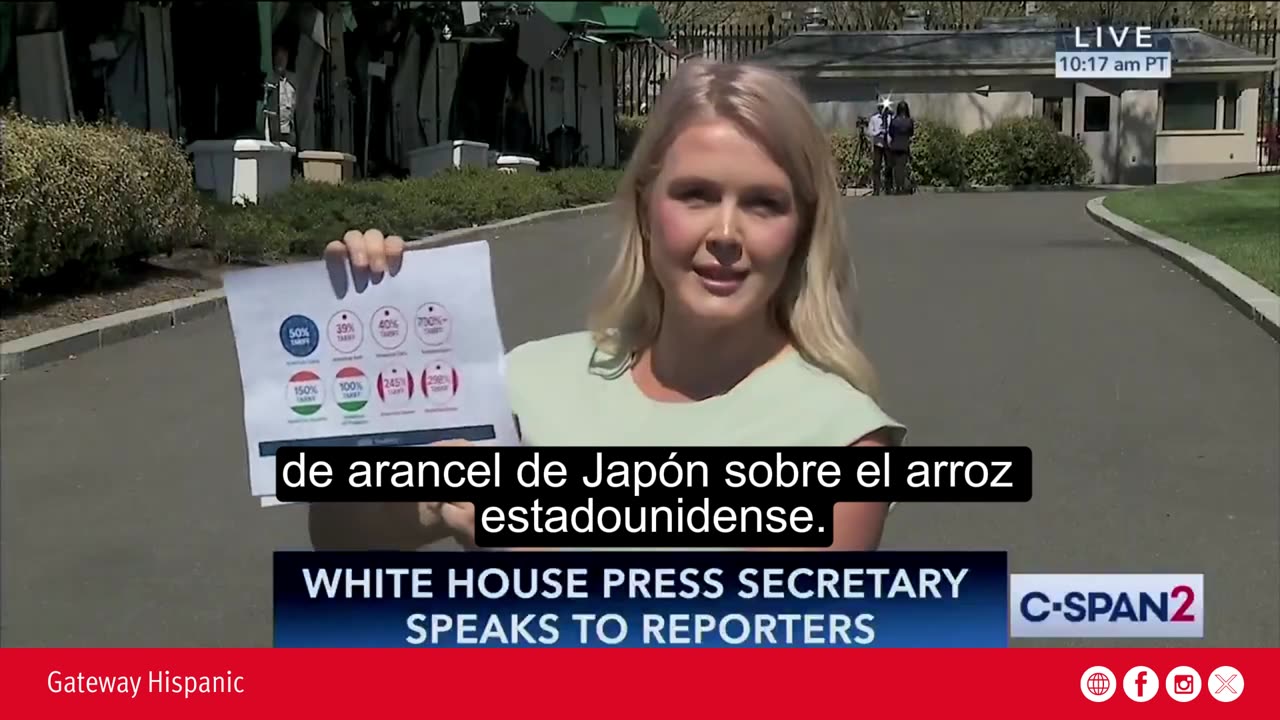Premium Only Content

Sec. Leavitt details the unfair trade practices that are hurting American business
Sec. Leavitt: "Well, I think, first of all, unfortunately, these countries have been ripping off our country for too long and have made their disdain for the American worker quite clear. If you look at the unfair trade practices we have, a 50% tariff from the European Union on American dairy, a 700% tariff from Japan on American rice, a 100% tariff from India on American agricultural products. You have a nearly 300% tariff from Canada on American butter and cheese.
This makes it virtually impossible for American products to be imported into these markets, and it has put many Americans out of business and out of work over the past few decades. So it's time for reciprocity, and it's time for a president to make historic change to do what's right for the American people. And that will happen on Wednesday."
Several countries have implemented high tariffs on U.S. products, which has negatively affected the competitiveness of these products in international markets and put U.S. producers and workers at a disadvantage. Some notable examples include:
The European Union imposes a 50% tariff on U.S. dairy products.
Japan imposes a 700% tariff on U.S. rice, making it difficult to sell this product in their market.
India charges a 100% tariff on U.S. agricultural products, such as fruits and vegetables, affecting U.S. farmers.
Canada has imposed a tariff of nearly 300% on U.S. dairy products, such as butter and cheese, making these products more expensive and less competitive in that market.
These tariffs have made it difficult for U.S. producers to export their goods, leading to many entrepreneurs and workers losing their jobs or being displaced by foreign competition. Over the years, this has been an increasingly concerning issue for the U.S. economy, especially in key sectors such as agriculture, food production, and dairy products.
In response to this situation, former President Donald Trump took aggressive measures to counter these tariffs and pressured other countries to modify their trade policies. Under his administration, Trump implemented a "reciprocal trade" policy, demanding that countries imposing high tariffs on U.S. products face similar measures. This was part of his broader "America First" approach, which aimed to protect U.S. economic interests and reduce the trade deficit with other nations.
-
 LIVE
LIVE
The Quartering
4 hours agoMMA Fighter Tries To K*LL Wrestler, Hollywood PANIC & Sam Tripoli's Favorite Conspiracies
17,923 watching -
 LIVE
LIVE
Dr Disrespect
4 hours ago🔴LIVE - DR DISRESPECT VS. JEAN-CLAUDE VAN DAMME - HITMAN
2,117 watching -
 1:05:04
1:05:04
Mark Kaye
3 hours ago🔴 Trump Sends Dems Into RAGE Over Flag Burning Executive Order
4.12K3 -
 29:39
29:39
Afshin Rattansi's Going Underground
1 day agoEx-Israeli PM Ehud Olmert: INTOLERABLE Amount of Innocent Palestinians Have Been Killed in Gaza
1.73K23 -
 7:49
7:49
Dr. Nick Zyrowski
6 months agoVitamin D is Dangerous? Get The TRUTH!
3.08K10 -

daniellesmithab
2 hours agoExploring Nuclear Energy in Alberta
7.57K2 -
 LIVE
LIVE
Reidboyy
57 minutes agoNEW FREE FPS OUT ON CONSOLE NOW! (Delta Force = BF6 with Killstreaks)
62 watching -
 2:30:04
2:30:04
Nerdrotic
4 hours ago $1.18 earnedNerdrotic Nooner 509
18.7K1 -
 1:48:16
1:48:16
Tucker Carlson
2 hours agoCliffe Knechtle Answers Tough Questions About the Bible, Demons, Israel, Judas, Free Will, and Death
64.4K114 -
 LIVE
LIVE
Viss
3 hours ago🔴LIVE - How To Winner Winner Chicken Dinner! - PUBG
132 watching